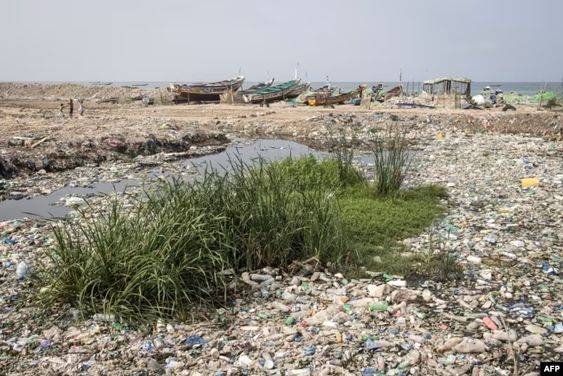Africa
Senegal is covered in plastic waste from common water sachets

Moussa Ndoye, a 28-year-old beachgoer in Dakar, the capital of Senegal, quickly downs the contents of two plastic sachets before tossing them into the sand.
He laughs, seated with buddies under the cover of a sizable wooden fishing boat, “This is our trash can.”
Waste plastic, including translucent, pocket-sized drinking water sachets, is all over the white sand shore.
The sachets are an essential part of daily life in Senegal since they are convenient, simple to buy in stores or from street vendors, and less expensive than water bottles.
However, they are a significant source of the plastic garbage that pollutes the nation’s streets and coastlines in West Africa.
Adams Tidjanis, a professor of environmental studies at a private institution in Dakar, claims that it takes 400 years for water sachets to break down into microplastics.
According to a 2022 assessment by the Ministry of Urban Planning, more than 250,000 metric tonnes of plastic are dumped in Senegal each year, while only around 30,000 tonnes are recycled.
According to Pape Diop, the executive director of an organisation dedicated to environmental protection, “there are a lot of them on the beaches; they’re part of the plastic waste we see most.”
formerly, “fishermen took cans (of water) to sea, but now they use sachets of water, drink them, then throw them away — this waste all end up here (on the beach) because the sea rejects it,” he continues.
Plastic toxicity
The sachets contaminate the water and clog drains, which increases urban flooding.
They’re frequently burned alongside other waste, which releases poisons into the air.
They clog up athletic fields, building sites and busy junctions in Dakar.
The warmer season, which lasts from June through October, makes them more obvious.
It is a widespread occurrence, with water sachets being widely used in Nigeria, the Ivory Coast, and Burkina Faso.
Bans on single-use plastics that went into effect in Kenya and Rwanda in 2017 and 2019, respectively, make them illegal there.
Senegal added on a 2015 law by passing similar single-use plastics legislation in 2020.
But in view of the COVID-19 pandemic, which severely impacted individuals who live day to day, an exemption was created for the sachets and other plastic types.
Khadidjatou Drame, who oversees legal affairs at the environment ministry, argues that “our socio-economic realities do not allow us to move towards their total ban.”
The market for water sachets in Dakar is contested by over 50 brands. The sachets can be purchased singly or in bundles of 30.
On the open market, 400 ml sachets go for 50 CFA francs ($0.08). It costs 25 CFA francs for 250 ml of sachets.
Health issues
In 2017, 63-year-old Amadou Diallo introduced the “Debeya” brand.
In his modest factory in the Guediawaye neighbourhood of Dakar, tap water is purified by passing through three blue tubes containing cotton, thread, and coal.
The water continues to flow through two 1,000-liter tanks before entering a packaging device that fills and seals the sachets before depositing them in a blue basin.
During the heat season, Diallo claims to manufacture 9,000 to 12,000 sachets daily.
A cubic metre of tap water costs 202 CFA francs, so getting started doesn’t cost much.
According to Mbaye Loum, director of the National sanitary Service of the health ministry, all producers are required to have government authorization in order to operate, but many do not adhere to sanitary standards.
Many clients told AFP they are curious about the water’s source.
Diallo, whose business is legal, acknowledges that “we can’t even count” the number of competitors that operate covertly.
“They set up their factories behind closed doors and you wouldn’t even suspect that water is produced (inside).”
